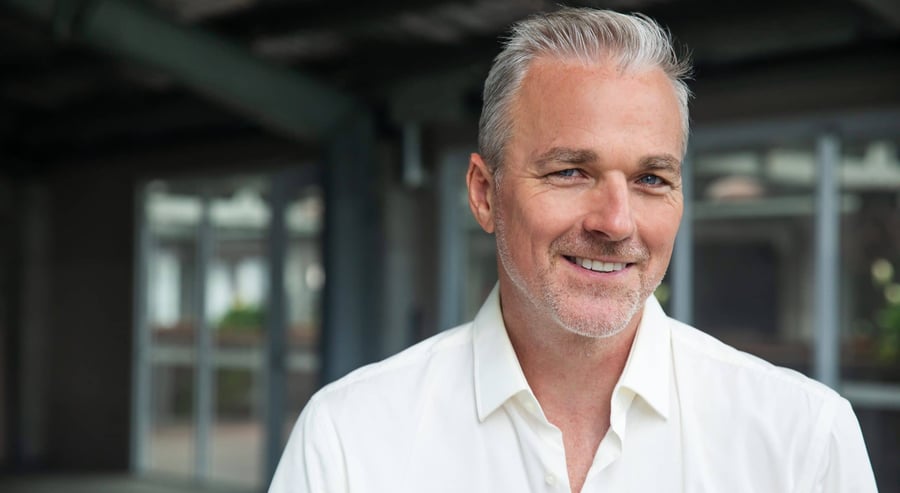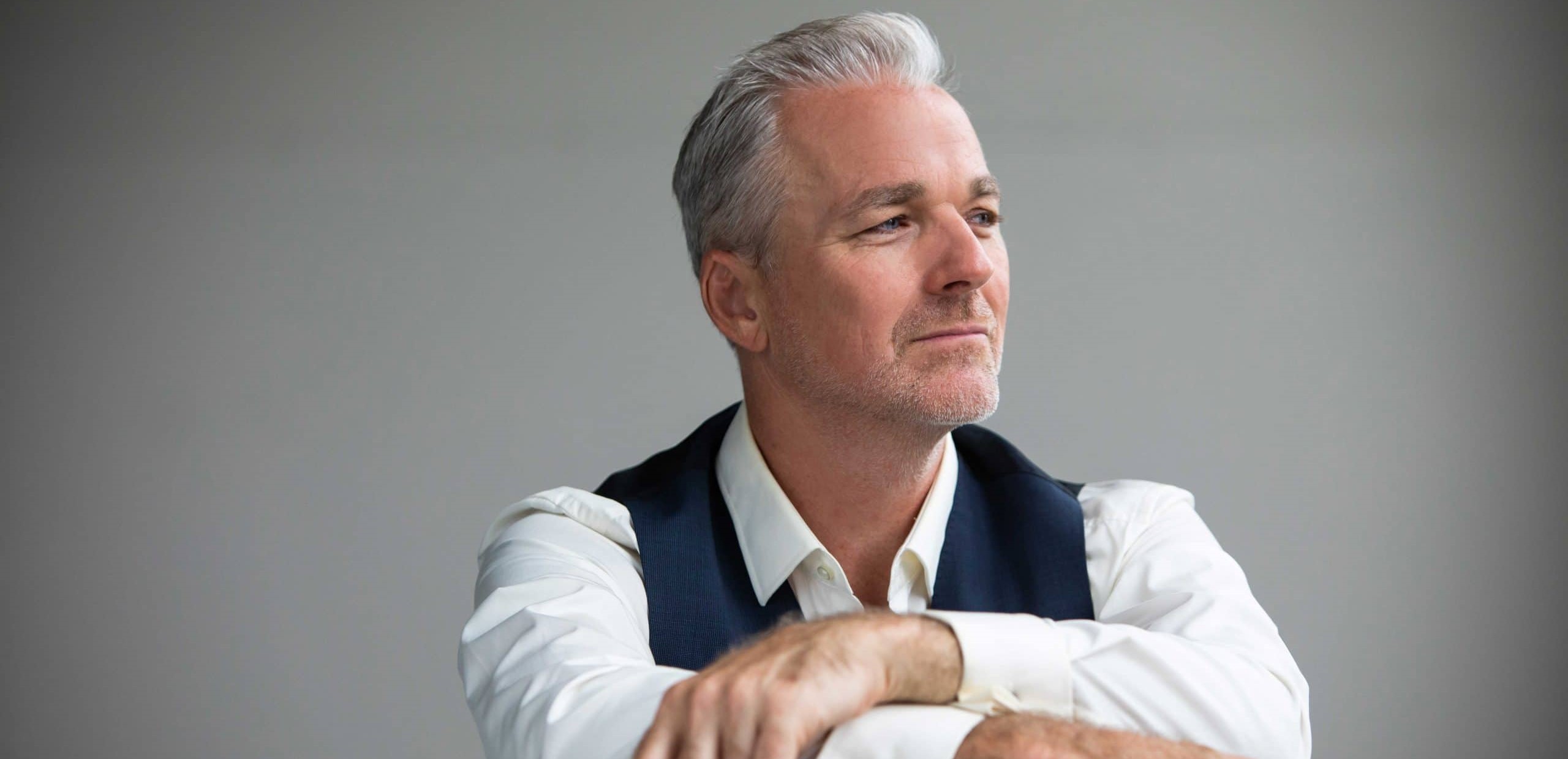Lawrence Ellyard is a man of many pursuits; founder of IICT, father, speaker, author, thought leader and visionary. We find out what lights Lawrence up, how he consistently replenishes his well of inspiration and ideas, what he thinks of failure and so much more.

Lawrence Ellyard is a multifaceted individual who embodies depth, versatility and an unwavering commitment to self-growth. It was Lawrence’s mother who introduced spiritualism and the occult to him from an early age, sparking his curiosity and paving the way for him to delve into various paths of personal and spiritual development.
When Lawrence was seven he started practicing martial arts. This ancient practice taught him the power of poise, precision, discipline and flexibility. Then, when he was 17, he attended a personal development course with his parents. “The weekend course explored the power of the mind and deeply impacted me. From that point onwards, I started to tune into different types of natural therapies. When I was 18, I learned Reiki, which exposed me to meditation, and I started to see that there’s a deeper layer beyond the ordinary.”
Lawrence has been fortunate to work under spiritual masters from various traditions, each imparting insights that empowered him to navigate life’s challenges with resilience and grace. Namgyal Rinpoche, Lawrence’s first Buddhist master, taught him how to bring mindfulness into everyday life, while Lama Ole Nydal from Diamond Way Buddhism revealed deeper insights into the limitless nature of the mind. Then, under the guidance of Dr Rafael Locke, Lawrence studied shamanism, going on to become a Minister in the Spirit of the Earth Medicine Society. He is also an Aikido Sensei (4th Dan black belt).
“My martial arts teachers have taught me a great deal and not just about the physical art; the energetics of this spiritual practice”, Lawrence shares. Through his extensive studies, spiritual practices and martial arts have been a gateway to self-discovery and personal growth.
“If we don’t honour this transition – this sense of struggle, of pushing up against something and breaking through into something new – our young men and women will seek that out themselves.”
These days, Lawrence teaches martial arts and trains a few times a week. He also co-facilities men’s circles and helps to initiate rites of passage for young adults. “Unlike traditional indigenous cultures, we don’t have rites of passage here in Australia. However, there will always be a point when boys become men and girls become women. As a culture, we need to hold space for this transition, to celebrate and acknowledge its significance. If we don’t honour this transition – this sense of struggle, of pushing up against something and breaking through into something new – our young men and women will seek that out themselves. And, when doing so, it may not manifest in a positive way. Our youth need to be surrounded by peers that are there to support and hold their growth”, Lawrence explains.
Fail fast and fail often
For Lawrence, failing is a very helpful tool. The key, he suggests, is to not spend too long in the failure. “I believe every failure will be a stepping stone to your success. As humans, we all like to be comfortable but we don’t grow when we’re comfortable. When it comes to your business, the same applies. Often, it’s the pressure that creates the desired outcome.”, he reveals.
“When I was younger, I took a lot of risks but as I’ve gotten older, I’ve learned to pause, get clear, add strategy, and then make a decision. When I do decide on something, however, I act fast. Over the years I’ve learned to get out of my head and trust my gut instinct as it's rarely wrong.”
“Failing is a very helpful tool. The trick, however, is to not spend too long in the failure.”
It was this gut instinct Lawrence listened to in 2002 when the vision to create a professional membership body for the complementary therapy industry was realised. Soon after, he founded the International Institute for Complementary Therapists (IICT).
“In preparation for founding IICT, I carefully compared the codes of practice and ethics of many associations and complementary therapies. From these, I developed our own unique code that not only contained the necessary items for professional practice but also provided enough flexibility and diversity to accommodate multiple modalities. Over the years, our list of available modalities grew from 120 to more than 1,100, making IICT proud to provide the largest modality list in the world for professional membership and insurance”, he shares.
Today, IICT stands as the only organisation that actively assists practitioners to have their modalities recognised for professional membership and insurance. Under Lawrence’s expert guidance, IICT has become a symbol of freedom for thousands of complementary therapists.
Find your flow state
So where does Lawrence’s seemingly boundless wellspring of ideas originate? What is the source of his creative inspiration? His ideas are generated when he is in flow. “Anything that gets me into a flow state, such as surfing, martial arts, or riding my motorbike, gives me inspiration, clarity and spaciousness”, he explains.
“Meeting new people and travelling helps me access new ideas. I find that by getting out of the ordinary, I can explore the extraordinary and download any information that I may need.”
Lawrence also spends a lot of time in curiosity, which keeps him open to possibility. “When I sit in the space of curiosity, I can assume I don’t know everything. There, I stay open to what arises in the moment. On the contrary, if I have a fixed view or mindset, I very much limit my possibilities of what can be experienced,” Lawrence shares.
Lawrence’s top three books of influence
Lawrence admits to an insatiable thirst for knowledge. In a perpetual state of learning, he reads somewhere between 50 to 100 books a year. These are his top three reads (for now):
Think and Grow Rich - Napoleon Hill
“My dad introduced me to Think and Grow Rich by Napoleon Hill. When I was a teenager. Even though the book was written in 1937, the details still ring true today. With a strong focus on personal development and self-improvement, it’s a timeless read that should be on every bookshelf.”
Get Everything You Can Out of All You’ve Got – Jay Abraham
“Get Everything You Can Out of All You’ve Got by Jay Abraham is a fantastic book for anybody who is in business. It teaches how to look outside the box with your thinking and view things from many different directions simultaneously.”
Traction – Gino Wickman
“For general strategy, Traction by Gino Wickman is like a blueprint for business success. It takes you through all the different aspects from being a solo person in terms of business and then scaling it to growing a team. It’s a very holistic approach to business and covers pretty much every possible vantage point to grow and scale your business. Its wisdom applies to anyone in the natural therapy space.”

Lawrence’s top three mindset shifts before joining the complementary therapies industry
1. Have a plan
Lawrence is a strong believer in having a plan. “It’s important to have a clear vision of where you want to go. When you are first starting, you might have a lot of enthusiasm but not a lot of clarity or direction. That’s okay. Start to develop a plan – where do you want to see your business in five or 10 years? If you keep that at the forefront, life will give you what you need. The right lessons, the right people and the right circumstances will reveal themselves.”
2. Stay open and never give up
“Stay open to new experiences, teachings and lessons. Adopt an attitude of not giving up, because you’re likely to try something and it will fail. It’s important to keep failing until you get to where you need to be but don’t go blindly. Find your teachers.”
3. Find your mentors
“Seek advice or get support from a mindset or business coach if you can. Pursue your mentors and teachers and keep them close. Mentors keep us accountable, help us to see things in different ways, and are an invaluable resource.”
Article written by: Kate Duncan, IICT
About the Author:

|
|
Kate is Head of Content and Marketing at IICT and has been a prominent voice in the wellness industry for over a decade. Kate’s experience as the editor of two Australian health and wellness magazines offers a wealth of insights into the natural health space, which she now shares with IICT. Kate has extensively studied Yoga, Ayurveda and Massage Therapy.
When she’s not working, you’ll find Kate treasuring moments with her son, surfing one of Byron Bay’s beautiful breaks or spending time in nature with her family.
|